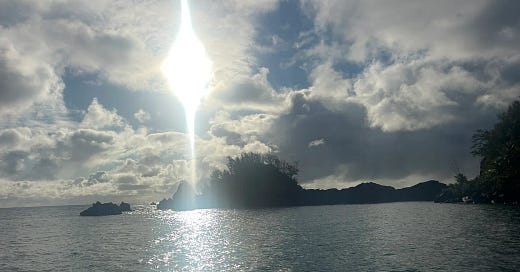I wake just before first light, grab my coffee, and sit in the quiet stillness of the birthing day. The space around me is bathed by glints of milky light, pregnant with possibility. I am present. All is becoming. “Morning,” Thoreau wrote, is when “there is dawn in me.” And it’s true even as the world seems torn asunder and spiraling down a darkening path, there is always new light if we just learn how to let it in.
For Thoreau, who waxed eloquent about the intellectual clarity, moral and political grounding, and spiritual enlightenment that came when he was awakened not by “the mechanical nudging of some servitor” but by his own “Genius,” the morning was a time of self-realization. It brought him the solidity and courage to fight for the abolition of slavery, the defense of the commons, and the preservation of the natural world he loved.
To be awake is to sense the naked urgency of every moment.
Clarice Lispector was taken by Thoreau’s injunction to “do now what matters most to us as individuals” because “if you are unhappy now, then do something about it now, because we exist in a series of nows.”
Seize them as they will never return.
To wake up is the central mission of our lives. It is how we escape from “quiet desperation” to discover the beautiful discipline of living, caring for others and the world: “To be awake is to be alive. I have never met a man who was quite awake. How could I have looked him in the face?”
When the sun rises, so do we. This existential experience of reality affirms us. From the president to the prostitute, as Whitman reminds us, the sun shines the same on everyone, no matter our social status. The new day shows us the fundamental goodness of being alive and the universal dignity of all beings.
Even those of us who do what some see as the dirty work or are judged to be part of the muck of the world that we shun are essential to life. No one is irredeemable. No matter how down or despised we are, how many debts we have, or obstacles to overcome, we all have access to the underlying radiance of existence.
The work of our lives is to pull ourselves up toward the light without ever losing track of the darkness that can enfold us. If we proceed wisely, we hold on to the fact that the world is full of suffering but not exclusively defined by it. Delight lives inside the temple of despair. We can find strength in sitting on the razor’s edge of this rawness.
So, I rise early, sip my coffee, and, wherever I am, feel the air about my body. I sense the flow of my breathing, hear the birds, the bus, the ocean, the distant traffic, and feel the world rising in me—myself a part of it, it a part of me. Yet there is war, oppression and hate. I know that I am born to die and do not know when. The same is true for all of us. What, then, am I going to do about it?
The work is long and hard but ultimately beautiful.
I don’t know for certain if I will ever see the sun glow again as it does today or come to understand its full glory as it casts its rays across the world.
I am alive. I know that, and I am waking, but I have never met a person who was quite awake.
How could I have looked them in the face?
The birds sing and the wind blows, and the delicate music of the dawn comes fluttering through the leaves of trees into my window, all the way back behind my eyes to the heart of the instant.
Note on the Summer Chronicles:
Over a decade ago, during my time writing for the OB Rag and SD Free Press, I penned a series of pieces over the summer that moved beyond the blog/column form to something a little looser and more open to improvisation and the poetic turn.
Below is the original preface for the first series of chronicles:
In the summer of 1967, the great Brazilian writer, Clarice Lispector, began a seven year stint as a writer for Jornal de Brasil [The Brazilian News ] not as a reporter but as a writer of "chronicles," a genre peculiar to Brazil. As Giovanni Pontiero puts it in the preface to Selected Chrônicas, a chronicle, "allows poets and writers to address a wider readership on a vast range of topics and themes. The general tone is one of greater freedom and intimacy than one finds in comparable articles or columns in the European or U.S. Press."
What Lispector left us with is an eccentric collection of "aphorisms, diary entries, reminiscences, travel notes, interviews, serialized stories, essays, loosely defined as chronicles." As a novelist, Pontiero tells us, Lispector was anxious about her relationship with the genre, apprehensive of writing too much and too often, of, as she put it, "contaminating the word." It was a genre alien to her introspective nature and one that challenged her to adapt.
More than forty years later, in Southern California—in San Diego no less—I look to Lispector with sufficient humility and irony from my place on the far margins of literary history with three novels and a few other books largely set in our minor league corner of the universe. Along with this weekly column, it's not much compared to the gravitas of someone like Lispector. So, as Allen Ginsberg once said of Whitman, "I touch your book and feel absurd."
Nonetheless the urge to narrate persists. Along with Lispector, I am cursed with it—for better or worse. So for a few lazy weeks of summer, I will try my hand at the form.




